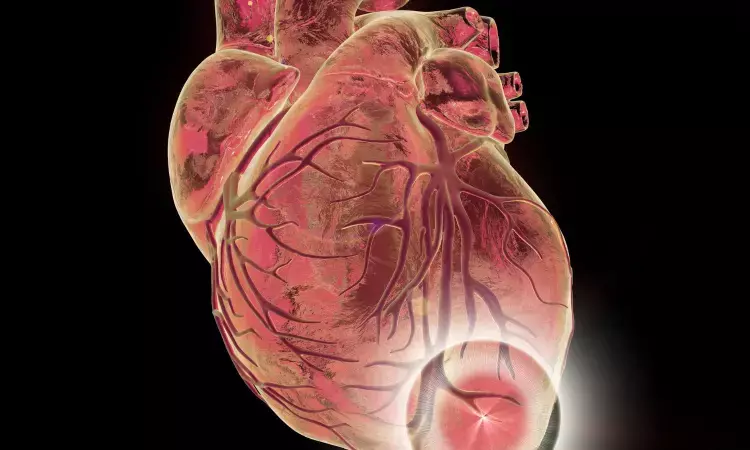- Home
- Medical news & Guidelines
- Anesthesiology
- Cardiology and CTVS
- Critical Care
- Dentistry
- Dermatology
- Diabetes and Endocrinology
- ENT
- Gastroenterology
- Medicine
- Nephrology
- Neurology
- Obstretics-Gynaecology
- Oncology
- Ophthalmology
- Orthopaedics
- Pediatrics-Neonatology
- Psychiatry
- Pulmonology
- Radiology
- Surgery
- Urology
- Laboratory Medicine
- Diet
- Nursing
- Paramedical
- Physiotherapy
- Health news
- Fact Check
- Bone Health Fact Check
- Brain Health Fact Check
- Cancer Related Fact Check
- Child Care Fact Check
- Dental and oral health fact check
- Diabetes and metabolic health fact check
- Diet and Nutrition Fact Check
- Eye and ENT Care Fact Check
- Fitness fact check
- Gut health fact check
- Heart health fact check
- Kidney health fact check
- Medical education fact check
- Men's health fact check
- Respiratory fact check
- Skin and hair care fact check
- Vaccine and Immunization fact check
- Women's health fact check
- AYUSH
- State News
- Andaman and Nicobar Islands
- Andhra Pradesh
- Arunachal Pradesh
- Assam
- Bihar
- Chandigarh
- Chattisgarh
- Dadra and Nagar Haveli
- Daman and Diu
- Delhi
- Goa
- Gujarat
- Haryana
- Himachal Pradesh
- Jammu & Kashmir
- Jharkhand
- Karnataka
- Kerala
- Ladakh
- Lakshadweep
- Madhya Pradesh
- Maharashtra
- Manipur
- Meghalaya
- Mizoram
- Nagaland
- Odisha
- Puducherry
- Punjab
- Rajasthan
- Sikkim
- Tamil Nadu
- Telangana
- Tripura
- Uttar Pradesh
- Uttrakhand
- West Bengal
- Medical Education
- Industry
ECMO linked with increased bleeding risk among patients with cardiogenic shock

Venoarterial extracorporeal membrane oxygenation (VA-ECMO) is a form of temporary mechanical circulatory support and simultaneous extracorporeal gas exchange.
A recent study published in The Lancet has concluded that VA-ECMO did not decrease the 30-day mortality rate in individuals with cardiogenic shock related to infarct, and a rise in severe bleeding and vascular complications was documented by the team of researchers in this study.
Despite the lack of scientific evidence from adequately powered randomized clinical trials, the use of VA-ECMO in patients with cardiogenic shock has increased. Three trials reported so far were underpowered to detect a survival benefit. There needs to be data based on individual patient-based meta-analyses to determine the impact of VA-ECMO on 30-day death rates. This background was studied in the present study.
Researchers searched MEDLINE, Cochrane Central Register of Controlled Trials and Embase. They identified RCTs comparing early routine use of VA-ECMO versus optimal medical therapy alone in patients presenting with infarct-related cardiogenic shock.
The primary outcome was determined as Odds ratios (ORs) pooled using logistic regression models.
Key findings from this study are:
- Four trials were identified.
- There were 567 patients, 284 in VA-ECMO and 283 in control.
- With the early use of VA-ECMO, there was no significant reduction in the 30-day death rate with OR 0·93.
- Relating to major bleeding and peripheral ischaemic vascular complications, the rates of complication were higher with VA-ECMO with OR 2.44 and 3.53, respectively.
- Prespecified subgroup analyses were consistent. They did not show any benefit for VA-ECMO.
Interpreting further, they said, “Based on the results of our study, VA-ECMO did not reduce the 30-day death rate compared with medical therapy alone in patients with infarct-related cardiogenic shock.”
We noted an increase in major bleeding and vascular complication, they wrote. A careful review of the indication for VA-ECMO in this setting is warranted.
As acknowledged, the Foundation Institut für Herzinfarktforschung funded the study.
Reference:
Zeymer et al. Venoarterial extracorporeal membrane oxygenation in patients with infarct-related cardiogenic shock: an individual patient data meta-analysis of randomized trials. The Lancet, 402(10410), 1338–1346. https://doi.org/10.1016/s0140-6736(23)01607-0
Dr. Manav Aggarwal is a Interventional Cardiologist,Cardiologist and General Physician in Darya Ganj, Delhi and has an experience of more than 10 years in these fields. Dr. Manav Aggarwal practices at Sanjeevan Hospital in Darya Ganj, Delhi.
Dr Kamal Kant Kohli-MBBS, DTCD- a chest specialist with more than 30 years of practice and a flair for writing clinical articles, Dr Kamal Kant Kohli joined Medical Dialogues as a Chief Editor of Medical News. Besides writing articles, as an editor, he proofreads and verifies all the medical content published on Medical Dialogues including those coming from journals, studies,medical conferences,guidelines etc. Email: drkohli@medicaldialogues.in. Contact no. 011-43720751


